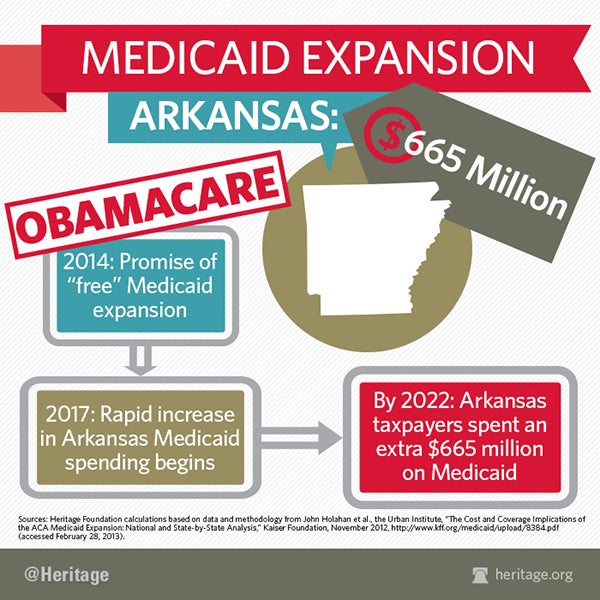Medicaid Expansion in Arkansas: A Fig Leaf, Not a Solution
Dan Greenberg /
As action to stop Obamacare languishes in Washington, the debate continues at the state level. Heritage is hosting a series of health care reports from our allies in the states to provide an up-close view of state-level action regarding Obamacare.
The states play an important role in protecting citizens against this flawed federal health care law–from challenging the health care law before the Supreme Court, to resisting efforts to establish Obamacare exchanges or expand a failing Medicaid program, to offering alternative proposals that will ensure citizens are not left abandoned when the federal law collapses.
Today, Dan Greenberg—President of the Advance Arkansas Institute—updates Foundry readers on developments in Arkansas.
A bipartisan alliance succeeded in convincing the Arkansas legislature to expand Medicaid. That was because enough Republicans were won over by the legislation’s theoretically pro-market design. However, a closer look suggests a textbook case of a beautiful theory slain by ugly facts.
Republican proponents of expansion claimed that the proposal was fundamentally different from a traditional Medicaid expansion, because it would enroll the new Medicaid clients in private insurance through the state’s Obamacare exchange. They dubbed it the “private option,” and argued that private plans would provide better care at lower cost.
When the arrangement was first proposed, it was greeted with cautious optimism in some quarters. But that optimism predated the “Good Friday memo” from the U.S. Department of Health and Human Services, which clarified that any Medicaid expansion provided through private coverage would still have to conform to standard Medicaid benefit requirements and cost-sharing limitations.
In plain English, the maneuver Arkansas was contemplating would gain the state no additional flexibility on benefits or cost sharing beyond the (very limited) scope allowed under current federal Medicaid rules.
Thus, the notion that the “private option” could somehow produce significantly lower costs and better patient outcomes relative to traditional Medicaid became highly doubtful. At best, it would simply be a variant on the existing and common strategy of states contracting with private managed care companies to deliver Medicaid benefits. Yet, while the policy differences were vanishingly small, to the point of nonexistent, the rhetorical shift was enough for the pro-expansion forces to eke out a win in the end. Given that, it is worth deconstructing the rhetoric offered in support of the Arkansas plan.
- The expansion isn’t really an expansion. Medicaid expansion, explained Republican Representative Charlie Collins, “is dead.” The expansion that Republican lawmakers were crafting was supposedly categorically different. Collins argued that the “private option” would take hundreds of thousands of people off the Medicaid rolls. Yet the notion that clients who get their Medicaid benefits through a private plan are somehow not on the Medicaid rolls is as factually incorrect as saying that seniors who get their Medicare benefits through a private Medicare Advantage plan are magically not in Medicare.
- Reforming the state’s existing Medicaid program required expanding Medicaid to new enrollees. Private-option advocates argued that a number of taxpayer-friendly Medicaid reforms included in the legislation were part of the private option, implying that those reforms were an inseparable part of Medicaid expansion, but the need for joining these two measures was never explained. Indeed, at no point in the debate did the advocates offer to simply strip out the expansion provisions and then enact the other, meritorious reforms—such as new measures to detect and deter Medicaid fraud and abuse.
- Medicaid expansion was linked to tax relief and economic growth. Democratic Governor Mike Beebe claimed that the two were linked, while Republican Speaker of the House Davy Carter provided a more nuanced explanation suggesting that negotiations over tax relief were in conjunction with Medicaid expansion. Speaker Carter also appeared to argue that the private option would increase net state government revenue. Shortly after the votes for Medicaid expansion were secured in the House, multiple tax relief bills began to roll onto the House floor. Yet, after the votes for Medicaid expansion were secured in the Senate, most of those tax relief bills were immediately amended so that they would not take effect until future budget years. If there was, in fact, some deal between the Governor and the legislative leadership that tied tax relief to the Medicaid expansion, its terms were never made public.
- Arkansas could exit from expansion if federal promises weren’t kept. The legislation included provisions for the state to reverse the expansion if the federal government’s promised funding declined in the future. Setting aside the political question of how likely it is for politicians to terminate a government program—especially one that creates hundreds of thousands of new clients—once it has begun, there are also legal and constitutional questions about whether the contractual commitments that Medicaid expansion creates might make it a one-way street. To their credit, private-option advocates attempted to minimize the “Hotel California” problem with a last-minute amendment to their bill.
In sum, the advocates of Medicaid expansion in Arkansas built bipartisan political support by linking the Medicaid expansion to conservative reform. Republican Senator Jeremy Hutchinson argued on the Senate floor that the private option was a “down payment” on future reform of “entitlement programs.” Republican Senator Jason Rapert argued that the private option was “essentially what we all say we want—Medicaid block grant funding to allow states to innovate for their own populations.” Indeed, Representative Collins argued that the private option would allow Arkansas to “transcend Obamacare” while Speaker Carter insisted that a vote for the private option is “a vote against Obamacare.”
Such statements are less analytical than rhetorical—and to those who understand the basic workings of Medicaid and Obamacare, they are unpersuasive. In any event, such statements were enough to let Governor Beebe achieve his goal of expanding Arkansas’s Medicaid program.
Dan Greenberg, the President of the Advance Arkansas Institute, is both a former member of the Arkansas legislature and a former Heritage Foundation analyst.

